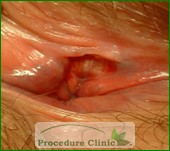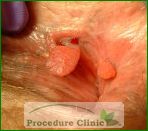For the complete information on sphincterotomy, please review the website
hemorrhoidheal.com

When you pass stool that is too hard or too large, a small tear may occur in the lining of the anal canal, known as an anal fissure. This could bleed and be very painful, but most of these heal without surgery. Anal fissures that fail to heal may become long term and cause significant irritation. The patients with chronic anal fissure may have discomfort, rectal pain, rectal bleeding with the bowel movement.
Your doctor will do a physical exam to confirm the diagnosis. You may need a colonoscopy to make sure no underlying disorder caused your rectal bleeding.
Acute anal fissures are fairly common and usually heal without treatment or with nonsurgical treatments. They may go away within two weeks. But if the tear doesn’t heal within six to eight weeks, you may need Botox injection or surgery for chronic anal fissure.
Nonsurgical treatments
A rectal cream containing hydrocortisone and the compounding medication Nifedipine gel may help it heal and reduce the discomfort. Botox injection into the internal anal sphincter has 90% effective rate by paralyzing the muscle for up to three months, but the insurance doesn’t cover for the Botox injection.
Surgery
If you have a chronic anal fissure that won’t heal on its own, surgery will most likely be the next option. The surgery, called partial anal sphincterotomy, may involve cutting a segment of the anal sphincter muscle to reduce spasm and promote healing, and may also include removing the fissure and any scar tissue resulting from it. Although rare, cutting the anal sphincter may lead to loss of ability to control bowel movements.
To help stop irritation and recurrences, as well as promote healing, you should increase fiber intake, drink enough fluids, exercise regularly, take baths, and avoid straining during bowel movements.
FAQ
Can the procedure be done in the doctor’s office?
Yes, partial anal sphincterotomy can be performed in the comfort of the office under local anesthesia. We perform less invasive surgeries using a radio frequency equipment.
How long is the procedure?
About 20 minutes.
Does the insurance cover for the surgery?
Yes.
Does it hurt? Any risks?
Pain is typically mild, and patients should alternate warm sitz baths with ice packs to reduce discomfort. Antibiotics may be prescribed as a precautionary measure against infection. The common surgical complications include the infection and bleeding. The worst side effect is fecal incontinence if the patients have pre-existing marginal incontinence, and if the surgeon cut too deep into the sphincter.
What is the effective rate of the surgery?
At least 90%.
How should I prepare for the procedure?
You will be given the pre-op bowel prep instructions.
Will anal fissure come back?
Recurring anal fissure may occur, although rarely. A sensible diet, moderate exercise, and proper bowel habits are helpful to prevent the recurrences.
For the complete information on sphincterotomy, please review the website
hemorrhoidheal.com





